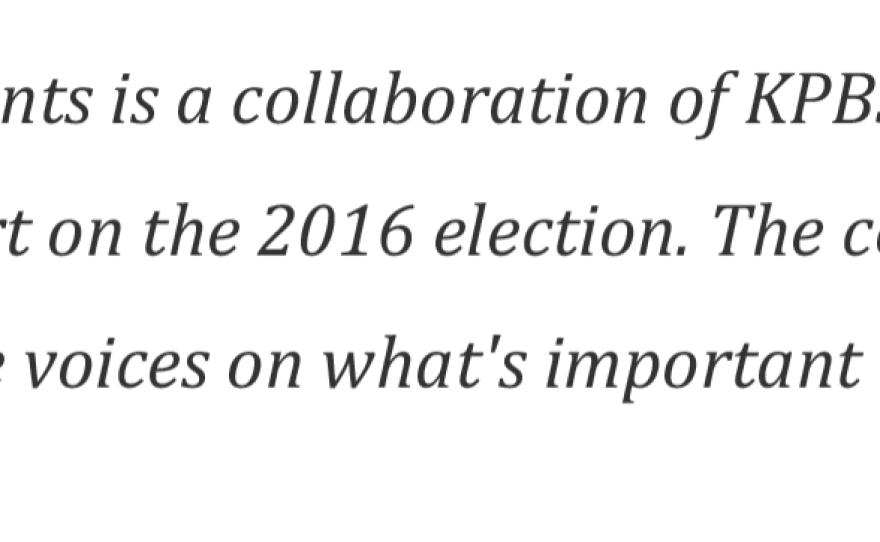It’s lunchtime in Watts, and Norma Salas and others have gathered in a home on Juniper Street to enjoy homemade tostadas and talk about a problem that’s growing more critical as California’s June 7 primary draws closer.
The issue: Few people vote in this South Los Angeles neighborhood, and as the community grapples with high crime rates, poverty and unemployment, community activists wonder how these problems will get solved when so many feel disengaged.
A mother of four, Salas worries daily about keeping her kids safe.
"We’re trying really hard to keep control of our lives, but all these politicians are the people who make decisions," she said. "So we have to, if we want it to go our way, we have to speak up. And so if we do not vote then it’s not going to happen."
As get-out-the-vote efforts ramp up in California ahead of the primary election, the influence of women, even those who like Salas can’t cast a ballot, could prove key in fulfilling the promise of the Latino vote this year.
With more than 6.9 million eligible Latino voters in the state, their collective influence could be substantial if participation is high. Low turnout in the past in communities like Watts, however, has blunted their political standing.
Fewer than 17 percent of Latinos voted in most of Watts' precincts during the 2014 general election. That's about 5 percentage points lower than the total population's turnout in most areas of Watts.
Resident Mery Alvarez said she feels like politicians have left Watts behind. She’d like to see more of them reach out to residents and provide civic education to the community.
Mobilizing the vote
Many of the women chatting over lunch here are Latina mothers and, although some are ineligible to vote because they’re not U.S. citizens, they are a secret weapon of sorts.
They care about Watts deeply and they’re telling their family members why voting matters, and in some cases, who and what they should vote for.
Leticia Martinez pays attention to the newspapers and candidates, but she can't vote. Her husband, who can vote, doesn't read up on the candidates or the issues. "When it's time to vote, I tell him, 'This is who you're going to vote for,'" she said, speaking in Spanish.
In Latino families, such influence is not unusual, according to Angelica Peña, California deputy director of civic engagement for the nonprofit National Association of Latino Elected and Appointed Officials Education Fund (NALEO).
"When we asked which family members folks felt would be best to engage them, we heard a lot of responses that were female — so my mother, my grandmother, my sister," Peña said.
Peña calls these people the "messengers," those most likely to motivate other Latinos to get out and vote.
"There’s this misconception that there’s apathy among our community members and that people don’t want to vote because they just don’t care. And that’s actually untrue," she said. "It’s not for a lack of interest or not understanding the importance of an election but just the feeling like they couldn’t relate to it."
NALEO conducted research in 2014 to uncover what practices proved most effective in mobilizing Latino voters. The group found that it's not celebrities nor community leaders who are best at convincing citizens to vote, but rather family members, including the women closest to them.
Outside Peña’s NALEO office recently, about a dozen workers were busy answering phone calls at the group's call center.
In May, the desks will be filled with phone canvassers working the phones to get out the vote as part of a nonpartisan campaign. They will be putting the insights from NALEO's voter research to the test, refining exactly who and what message works best to get Latinos to cast their ballots.
One longtime hotline worker is Lillian Meza. A mother and a messenger herself, Meza regularly encourages others to register to vote, jumping on social media platforms like Facebook to spread the word.
Meza has even done this work within her own family. She recently persuaded her 19- and 21-year-old daughters to register to vote. This year will be the first time they'll participate in a presidential election.
"Here, in California, we have online registration. So their morning breakfast, [I ask] did you register to vote already. Did you register to vote already? It only takes five minutes online," she said.
Meza's oldest daughter, Shirley Guzman, said in hindsight she's glad her mother pressed her to register.
"She would bring it up every single time," she said. "It was almost frustrating, but we understood like the importance of it."
As for Meza, she said she doesn't care who her daughters pick in the upcoming presidential election, just as long as they vote.
Copyright 2016 KPCC. To see more election coverage, www.kpcc.org.










